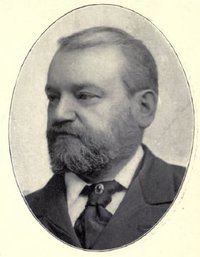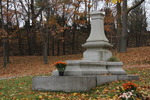
Source: Courtesy of Wikimedia Commons
NANTEL, GUILLAUME-ALPHONSE (baptized Guillaume-Alphonse-Ferdinand), lawyer, journalist, author, newspaper owner, and politician; b. 4 Nov. 1852 in Saint-Jérôme, Lower Canada, son of Guillaume Nantel and Adélaïde Desjardins; d. 3 June 1909 in Montreal.
Jean Berloin, dit Nantel, an ancestor of Guillaume-Alphonse Nantel, immigrated to New France in 1690. His descendant Joseph (1757–1833) was the first to abandon the name Berloin altogether, in favour of Nantel. Guillaume, who was born in Saint-Eustache, is believed to have moved to Saint-Jérôme in 1837 or 1838 to work as a tanner. He married Adélaïde Desjardins in Sainte-Thérèse-de-Blainville (Sainte-Thérèse) on 23 Oct. 1838, and they had four daughters and six sons, several of whom made names for themselves. Antonin, the eldest, became the superior of the Petit Séminaire de Sainte-Thérèse and was a highly respected author in his day; Pacifique followed a career in education, mainly as a school inspector in the Laurentians; and Wilfrid-Bruno divided his public life between the law and politics. But Guillaume-Alphonse was the best known, the most energetic, and the most versatile of all.
After doing his classical studies at the Petit Séminaire de Sainte-Thérèse from 1864 to 1872 and studying law in Montreal, Nantel was called to the Quebec provincial bar in 1875. He practised for some time in Montreal in partnership with Joseph-Aldéric Ouimet* before opening his own office in Saint-Jérôme. Wilfrid-Bruno joined his brother’s firm about 1885. On 2 June 1885 Guillaume-Alphonse married Emma Tassé in the cathedral of Saint-Jacques in Montreal. They were to have a son who died in infancy, and two daughters, one of whom, Antonia, would marry Athanase David*, a politician and the son of Laurent-Olivier David*. But law practice and family were not enough to fill Nantel’s life. He had already embarked on politics and journalism, which he carried on simultaneously and vigorously until the end of his life.
Nantel’s political career began in June 1882 with his election to the House of Commons as the Conservative member for Terrebonne; he inherited the seat from Louis-Rodrigue Masson, who had been appointed to the Senate. Nantel resigned the same year, however, to make way for Joseph-Adolphe Chapleau*, his political idol, who was impatient to make his mark on the federal scene. With Masson in the Senate and Chapleau in the House of Commons, Nantel became the real leader of the Terrebonne Bleus at the provincial level.
Elected to the Legislative Assembly by acclamation in a by-election of 19 Aug. 1882, Nantel was returned in Terrebonne in 1886 and 1890, and again won by acclamation in 1892; in 1897, despite the Liberal sweep, he carried the riding once more. During these years he did not remain an ordinary backbencher. He served as commissioner of public works in the cabinets of Charles-Eugène Boucher* de Boucherville and Louis-Olivier Taillon* from 21 Dec. 1891 to 11 May 1896, and then as commissioner of crown lands in the government of Edmund James Flynn*. On 12 Jan. 1897 he was charged with reorganizing the Crown Lands Department, which was given the new name of Lands, Forests, and Fisheries; Nantel stayed on as commissioner until 26 May 1897. He was very active within the provincial Conservative party and became its vice-president in 1896. In the social sphere, he was titular president of the exclusive Club Chapleau in the Laurentians, a private hunting and fishing club of which Sir Joseph-Adolphe was honorary president. In 1900 Nantel finally met his political match in Liberal Jean-Benoit-Berchmans Prévost*, when the long Liberal reign began in Terrebonne and the rest of the province. He sat out the 1904 election and was defeated by Prévost again in 1908.
By nature a moderate in politics, Nantel was even sometimes “an advocate of harmony at all costs,” according to journalist Pierre Godin. The mla for Terrebonne did not like political agitation, believing it did more harm than good to French Canadians. This attitude explains the stand he took both on the Riel affair [see Louis Riel*] and on the Manitoba school question [see Thomas Greenway]. On the first, he stood with Chapleau and the government of Sir John A. Macdonald*; on the second, he saw the “Manitoban explosion” as nothing more than a reaction to the movement led by Honoré Mercier* in Quebec following the Riel affair. Certainly, Nantel continued to be a party man in politics. He threw all his energy and the resources at his disposal – his newspapers, for example – into the battle against the Rouges. The political history of Terrebonne from 1880 to 1910 is marked by epic struggles between the Nantel and Prévost clans.
Nantel was not unquestioning in his loyalties. Nationalism, strongly tinged with Catholicism, led him to a distinctly autonomist position. According to historian Robert Rumilly*, Nantel once toyed with the idea – approved by Chapleau himself – of breaking the alliance made with the Tories in 1854 and “repudiating any bond with the federal Conservatives.” French Canadians could thus have formed a nationalist party free of ties to the Conservatives, without having to join the ranks of the Liberals. In 1900, however, Nantel raised the possibility of cooperation with the Liberal party of Simon-Napoléon Parent*. He ran in the provincial election as an independent Conservative in reaction against the Castor wing of his party – represented by Louis-Philippe Pelletier*, Thomas Chase-Casgrain*, and Thomas Chapais* – which had blocked his path to the premiership. He also dissociated himself from the English-speaking leaders of the Conservative party on the dispatch of Canadian contingents to South Africa, adopting the position taken by Henri Bourassa*. But the Liberals did not take the hand he proffered. The Prévost clan did not want to miss such a fine opportunity for grabbing Terrebonne, especially since Nantel’s offer of alliance was conditional on the Liberal party’s approval of his colonization program. Thus Nantel had no other choice in the campaign than to make a vigorous attack on Parent, complete with an accusation that he had squandered part of the national heritage by selling the province’s waters and forests to foreigners for a song. He had the support of newspapers such as La Vérité (Québec) and Le Pionnier de Sherbrooke, which shared his concern at the extent of the French Canadian exodus to the United States and demanded a return to a coalition government in the name of colonization, as in the days of curé François-Xavier-Antoine Labelle*. None the less Nantel lost to Prévost by a narrow margin on 7 Dec. 1900. Terrebonne would henceforth remain firmly in Liberal hands. In 1908, older and no doubt already ill, Nantel made one last but unsuccessful attempt to regain it.
Nantel’s career in journalism had begun in 1874, when he published a few articles in La Minerve (Montréal). In 1880 he joined forces with Rémi Tremblay, Ludger-Denis Duvernay, Trefflé Berthiaume*, and Georges Duhamel* to found La Fraternelle, a secret association. Its official organ was Le Courrier de Montréal, which had a supplementary weekly edition, La Feuille d’érable. The association had three objectives: “to bring about the greatest good for our country, to work especially for a religious and national aim, to uplift our race and raise it to the most exalted destiny.” The newspaper denounced emigration to the United States, advocated repatriation of French Canadians living there, and defended provincial autonomy. Still in Montreal, Nantel worked also as editor of Le Monde, founded in 1881, which became Le Monde canadien in 1897. In 1906 he was editor of L’Album universel, which prior to April 1902 had been known as Le Monde illustré. One of Nantel’s greatest claims to fame is perhaps his association with that authentic Quebec institution, La Presse. He lived through some dark days there, for the paper was in a poor financial state in 1887, just at the time Chapleau pressed him into becoming its co-owner. The experiment proved fruitless, partly because Nantel lacked funds, and in the fall of 1889 Chapleau began looking for a new saviour for the Conservative journal. Nantel stayed on as an editor, however, until 1892. He stopped contributing at the beginning of the 20th century, when La Presse maintained a benevolent neutrality towards Sir Wilfrid Laurier*, but returned in 1907 to write a regular political column dealing especially with colonization.
His journalistic career still had time to run. By the turn of the century he had become a pioneer of the regional press north of Montreal. In 1881 he and Édouard Marchand had bought Le Nord from its founder, the Saint-Jérôme notary Joseph-Amable Hervieux. The weekly now became the newspaper of the Nantels and the Conservative party, an official publication close to the Catholic Church and almost unquestioningly devoted to curé Labelle’s colonization campaign. By giving importance to the new localities (which by no means displeased the readers), Le Nord would attain a circulation of 500 by 1892. Nantel turned its administration over to his brother Wilfrid-Bruno in 1882, although he kept control of editorial policy. He took this decision because he was interested in another project, and in 1885 in Saint-Jérôme he launched La Campagne, a completely non-partisan daily dealing solely with agricultural matters. The venture was not viable and the newspaper, which became a tri-weekly at the end of 1886, ceased publication in April 1887. It embodied a journalistic concept whose time had not yet come. Le Nord, where he continued working, came to an end in 1901 when the Liberals and their organ, L’Avenir du Nord (Saint-Jérôme), were riding high in the Laurentian region. The Nantels reacted. Guillaume-Alphonse, in partnership with several businessmen, including, once again, Wilfrid-Bruno, founded La Nation that year. Published in Saint-Jérôme, the paper gave new currency to the ideas of Le Nord, but also undertook the mission of promoting the country’s independence, in opposition to the Liberals in Quebec and Ottawa, who in its view “were playing into the hands of British imperialism in Canada.” La Nation did not outlive its founder, and disappeared in 1909.
In addition to his work in journalism, Nantel also authored several publications devoted mainly to colonization and to questions of party politics. The best known of these, Notre nord-ouest provincial; étude sur la vallée de l’Ottawa (Montréal, 1887) and La colonisation du nord-ouest de la province de Québec (Montréal, 1895), were intended to promote Labelle’s program. He wrote Discours: exposé complet de la situation politique fédérale et provinciale . . . (Québec) in 1896 and followed it in 1899 with another distinctly partisan work, Les Conservateurs vengés! . . . (Montréal). He was also interested in other topics, as is clearly shown by his pamphlets Discours sur l’instruction publique (Québec, 1893) and Des études classiques (Montréal, 1898), and especially by a somewhat futuristic book, La métropole de demain, published posthumously in Montreal in 1910.
But Nantel was committed first and foremost to colonization. Not only as a politician, but also as an administrator, journalist, and author, he attached great importance to northern settlement. An ardent disciple of Labelle, he rose above strictly partisan considerations as far as possible and, like “the king of the north,” advocated a coalition of political parties to meet the threat to the safety of the “race” posed by the massive exodus of French Canadians to the United States. His strenuous efforts, with Labelle, to get rail transportation extended beyond Saint-Jérôme, and to break up the lumber companies’ monopoly on the northern forests, as well as his numerous writings, demonstrate his devotion to the cause. Although his cabinet experience made him more conciliatory towards the companies, Nantel would continue to the end to favour the interests of the settler, as is shown by his slogan, “Free land for a free colonist.” He advocated carrying out the wishes of the 1898 colonization congress, which recommended, among other things, “the establishment of agricultural credit by mutual societies, with a government guarantee.” The provincial election of 1900 gave him an opportunity to offer the people of Terrebonne a complete settlement program: free land grants to bona fide colonists; colonization roads preceding, rather than following the settlers; free schools in the new areas, and the extension of the railway beyond the village of Labelle. His defeat at the polls, removing him from power, made the promotion of his program more difficult. He had nothing left but his pen, which he placed at the service of this cause for the rest of his days.
Nantel died in Montreal on 3 June 1909, at the age of 56, when the diabetes from which he had suffered for a number of years took a turn for the worse. He was buried two days later in Notre-Dame-des-Neiges cemetery. L’Avenir du Nord, which had been his fierce enemy for more than a decade, nevertheless paid him a stirring tribute, describing him as “one of the best stocked minds in our political world, one of the wiliest orators in our electoral battles, one of the best informed and most courageous of our public figures.”
With Guillaume-Alphonse Nantel’s death, one of the great builders of the Laurentian region north of Montreal was gone. In his day he was a typical member of the traditional professional élite of Quebec, which through its endeavours for society left an indelible mark upon the history of the region. In Nantel’s case especially, there was an impact on the national scene as well. Influenced by Chapleau and curé Labelle, he brought an astonishing energy to bear in the service of what Rumilly has called his three passions: politics, journalism, and colonization.
AC, Montréal, État civil, Catholiques, Cimetière Notre-Dame-des-Neiges (Montréal), 5 juin 1909. ANQ-M, CE1-1, 2 juin 1885; CE6-13, 4 nov. 1852; CE6-25, 23 oct. 1838. Bibliothèque de l’Assemblée Nationale (Québec), Div. de la recherche, dossiers des parlementaires. L’Avenir du Nord (Saint-Jérôme, Qué.), juin 1909. É.-J [-A.] Auclair, Saint-Jérôme de Terrebonne (Saint-Jérôme, 1934), 253, 257. Pierre Godin, L’information-opium: une histoire politique du journal “La Presse” ([Montréal, 1973]). J. Hamelin et al., La presse québécoise, vols.2–4. Serge Laurin, Histoire des Laurentides (Québec, 1989). Gérard Malchelosse, “L’association ‘La Fraternelle’ (1880–83),” Cahiers des Dix, 24 (1959): 209–39. RPQ. Rumilly, Hist. de la prov. de Québec, vols.7, 9.
© 1994–2024 University of Toronto/Université Laval
Image Gallery

![Original title: L'honorable Guillaume-Alphonse Nantel, ministre des travaux publics [image fixe] / Montminy & cie et Armstrong](/bioimages/h100.6321.jpg)

Cite This Article
Serge Laurin, “NANTEL, GUILLAUME-ALPHONSE,” in Dictionary of Canadian Biography, vol. 13, University of Toronto/Université Laval, 2003–, accessed April 27, 2024, http://www.biographi.ca/en/bio/nantel_guillaume_alphonse_13E.html.
The citation above shows the format for footnotes and endnotes according to the Chicago manual of style (16th edition). Information to be used in other citation formats:
| Permalink: | http://www.biographi.ca/en/bio/nantel_guillaume_alphonse_13E.html |
| Author of Article: | Serge Laurin |
| Title of Article: | NANTEL, GUILLAUME-ALPHONSE |
| Publication Name: | Dictionary of Canadian Biography, vol. 13 |
| Publisher: | University of Toronto/Université Laval |
| Year of publication: | 1994 |
| Year of revision: | 1994 |
| Access Date: | April 27, 2024 |




























